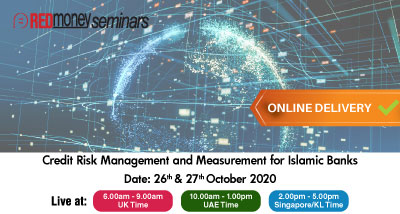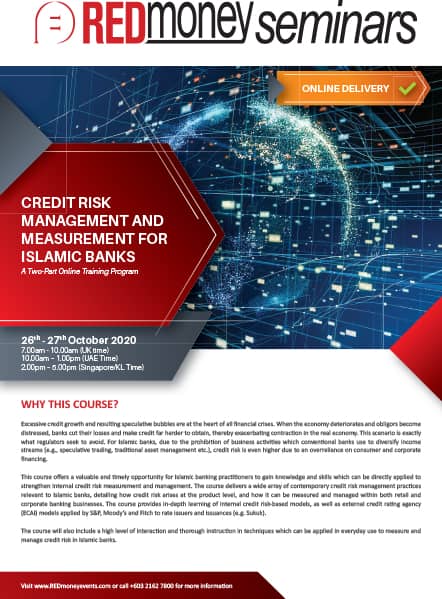PROGRAM INTRODUCTION
WHY THIS COURSE?
Excessive credit growth and resulting speculative bubbles are at the heart of all financial crises. When the economy deteriorates and obligors become distressed, banks cut their losses and make credit far harder to obtain, thereby exacerbating contraction in the real economy. This scenario is exactly what regulators seek to avoid. For Islamic banks, due to the prohibition of business activities which conventional banks use to diversify income streams (e.g., speculative trading, traditional asset management etc.), credit risk is even higher due to an overreliance on consumer and corporate financing.
This course offers a valuable and timely opportunity for Islamic banking practitioners to gain knowledge and skills which can be directly applied to strengthen internal credit risk measurement and management. The course delivers a wide array of contemporary credit risk management practices relevant to Islamic banks, detailing how credit risk arises at the product level, and how it can be measured and managed within both retail and corporate banking businesses. The course provides in-depth learning of internal credit risk-based models, as well as external credit rating agency (ECAI) models applied by S&P, Moody’s and Fitch to rate issuers and issuances (e.g. Sukuk).
The course will also include a high level of interaction and thorough instruction in techniques which can be applied in everyday use to measure and manage credit risk in Islamic banks.
WHAT WILL I TAKE AWAY?
- Understand how credit risk arises at product level in both retail and corporate banking books in Islamic banks.
- Learn how to measure credit risk using an array of techniques ranging from traditional single obligor credit assessment to more advanced portfolio credit risk models.
- Appreciate the methods used by ratings agencies use to establish a rating.
1 participant: RM995
2 participants: RM1990
3 participants: RM2985
4 participants: RM3980
5 participants: RM4975
Early Payment Discount: Payments made on or before 19th October will receive a 5% discount
* Further attractive packages are available for groups of more than five. Please contact us directly
If you are looking for an in-house training program or wish to send a group to an existing public program, kindly please contact Andrew Tebbutt at [email protected] or +603 2162 7802.
Learn More
Kindly complete the registration form and email to [email protected] or fax +603 2162 7810
Online Delivery
For enquiries please contact:
Normariya Sariman
Account Manager, REDmoney Seminars
[email protected]
Direct Line: +603 2162 7800 ext 44
Ramesh Kalimuthu
Events Sales Director
[email protected]
Direct Line: +603 2162 7800 ext 65
Fax: +603 2162 7810
For sponsorship & speaking opportunities:
Andrew Tebbutt
Managing Director
[email protected]
Direct Line: +603 2162 7802
For marketing and media enquiries
Govina Selvanthran
Marketing Manager
[email protected]
Direct Line: +603 2162 7800 ext 22

- Chief Risk Officers
- Chief Financial Officers
- Financial Risk Managers
- Treasury managers
- Risk Analysts
- Financial Analysts
- Senior credit officers
- Credit origination teams
- Credit Managers
- Credit Portfolio Managers
- Corporate bankers
- Retail bankers
- Relationship managers
- Supervisors, regulators and risk standard setters
This two-part training program will be delivered online through a stable, secure and free-to-access platform. The program itself will be delivered through lectures, worked examples and case studies in order to ensure a detailed and practical understanding of the program content. Participants will have plenty of opportunity to ask questions and interact with the program director. Login details and program materials will be sent to participants upon receipt of payment
1 participant: RM995
2 participants: RM1990
3 participants: RM2985
4 participants: RM3980
5 participants: RM4975
Early Payment Discount: Payments made on or before 19th October will receive a 5% discount
* Further attractive packages are available for groups of more than five. Please contact us directly
If you are looking for an in-house training program or wish to send a group to an existing public program, kindly please contact Andrew Tebbutt at [email protected] or +603 2162 7802./p>
Kindly complete the registration form and email to [email protected] or fax +603 2162 7810
Online Delivery
PROGRAM INTRODUCTION
WHY THIS COURSE?
Excessive credit growth and resulting speculative bubbles are at the heart of all financial crises. When the economy deteriorates and obligors become distressed, banks cut their losses and make credit far harder to obtain, thereby exacerbating contraction in the real economy. This scenario is exactly what regulators seek to avoid. For Islamic banks, due to the prohibition of business activities which conventional banks use to diversify income streams (e.g., speculative trading, traditional asset management etc.), credit risk is even higher due to an overreliance on consumer and corporate financing.
This course offers a valuable and timely opportunity for Islamic banking practitioners to gain knowledge and skills which can be directly applied to strengthen internal credit risk measurement and management. The course delivers a wide array of contemporary credit risk management practices relevant to Islamic banks, detailing how credit risk arises at the product level, and how it can be measured and managed within both retail and corporate banking businesses. The course provides in-depth learning of internal credit risk-based models, as well as external credit rating agency (ECAI) models applied by S&P, Moody’s and Fitch to rate issuers and issuances (e.g. Sukuk).
The course will also include a high level of interaction and thorough instruction in techniques which can be applied in everyday use to measure and manage credit risk in Islamic banks.
WHAT WILL I TAKE AWAY?
- Understand how credit risk arises at product level in both retail and corporate banking books in Islamic banks.
- Learn how to measure credit risk using an array of techniques ranging from traditional single obligor credit assessment to more advanced portfolio credit risk models.
- Appreciate the methods used by ratings agencies use to establish a rating.
AGENDA
Part One: 26th October
Credit Risk Profile, Limits and Mitigants
Credit Risk Profile- The products and services of Islamic banks
- Impact of Shariah compliance on risk management and capital structure
- Asset-based financing as opposed to lending
- Sukuk and implicit performance guarantees
- The status and uses of collateral and guarantees
- Late payments and the impact of Shariah restrictions
- Delinquency resolution
- Single obligor limits – e.g. gross limits versus net limits, loan to value, financial ratios etc.
- Concentration risk limits – large exposures, industries, and sectors
- Country limits, emerging markets, and data sources for country ratings
- Transaction/settlement limits
- Counterparty credit risk limits
- Connected counterparties
- Limit breaches and resolutions
- Collateral available to Islamic banks
- Which marketable securities can be used as collateral?
- What is the importance of haircuts?
- Positive and negative covenants
- Definition of default as a credit risk mitigant
- Guarantors and risk substitution
- Right to offset assets and liabilities with the same counterparty
- Takaful impairment insurance
Part Two: 27th October
Measuring Credit Risk
Retail Credit Risk- Credit scoring models
- Retail credit risk measurement at the portfolio level
- How is credit risk different by Islamic financing product?
- Murabaha for consumables
- Diminishing musharaka, e.g. home purchase plans
- Shariah compliant credit cards
- Shariah compliant overdrafts
- Ijara and IMB for vehicle leasing
- Overview of corporate credit risk assessment
- Scorecards – balancing qualitative and quantitative credit risk measures
- Credit conversion factors and off-balance sheet commitments
- Special considerations for Islamic banking exposures
- Application of the supervisory slotting method to Istisna’a
- Counterparty credit risk in Salam contracts
- Credit risk exposures in binding and non-binding promises to lease
- How do banks apply IRB models?
- Categories of exposure
- Model risk parameters, i.e. PD, LGD, EAD, M
- Foundation and advanced models – what’s the difference?
- Qualifying criteria to use IRB models
- Point-in-time versus through-the-cycle – what’s the difference and why does it matter?
- How do the ratings of different agencies compare?
- How do ratings agencies assess risk?
- Additional considerations for financial institutions
- What is accounting based versus market-based default prediction modeling?
- Stability and relative importance of ratings
EXPERT COURSE DIRECTOR

Dr Ken Baldwin
Former Director, Financial Policies & Planning, Islamic Development Bank
Dr. Ken Baldwin has worked as a practitioner in banking and finance for over 25 years in senior positions spanning the front and middle offices. Having graduated from Oxford University with a first-class honors degree in Physics in 1989, he qualified as a Chartered Accountant with PWC, before joining UBS, and then later Credit Suisse, in derivatives risk and control functions based in London.
He gained a PhD in the microeconomic theory of risk sharing in Islamic contracts, and worked in the GCC for 15 years in Islamic retail and Islamic investment banks. Whilst at Abu Dhabi Islamic Bank, Dr. Ken built an ALM analytic technology platform capable of capturing liquidity and interest rate risks inherent in the many varied Islamic financing products used at retail and corporate levels. He then moved to take up the position of MENA Regional Head of Quantitative Analysis for Citigroup. At Citicorp, Dr. Ken worked on structuring complex products used by Gulf-regional corporations to hedge FX and interest risks. Still residing in Bahrain, Dr. Ken then joined Investcorp, where he worked on the risk due diligence of corporate private equity and real estate private equity transactions and portfolio management. After leaving Investcorp, he set up the risk management department for venture capital bank, providing Basel III compliance and deal analysis for the bank. He then operationalized a new Islamic investment bank as its Chief Operating Officer for 3 years, before his most recent industry role at the Islamic Development Bank, where he set up and ran a new department tasked with developing Financial Policies and Planning underpinned by robust financial analytic tools and methodologies designed specifically for the IDB. Dr. Ken is currently a senior university lecturer in finance in the UK. He has published quantitative finance articles in peer-reviewed academic journals including the Journal of Risk, and during his earlier career, taught CFA and FRM professional certifications as a pastime for the Bahrain Institute of Banking and Finance.
Ken is a British Muslim.
WHO WILL BENEFIT MOST?
- Chief Risk Officers
- Chief Financial Officers
- Financial Risk Managers
- Treasury managers
- Risk Analysts
- Financial Analysts
- Senior credit officers
- Credit origination teams
- Credit Managers
- Credit Portfolio Managers
- Corporate bankers
- Retail bankers
- Relationship managers
- Supervisors, regulators and risk standard setters
PROGRAM FORMAT
This two-part training program will be delivered online through a stable, secure and free-to-access platform. The program itself will be delivered through lectures, worked examples and case studies in order to ensure a detailed and practical understanding of the program content. Participants will have plenty of opportunity to ask questions and interact with the program director. Login details and program materials will be sent to participants upon receipt of payment
For enquiries please contact:
Normariya Sariman
Account Manager, REDmoney Seminars
[email protected]
Direct Line: +603 2162 7800 ext 44
Ramesh Kalimuthu
Events Sales Director
[email protected]
Direct Line: +603 2162 7800 ext 65
Fax: +603 2162 7810
For sponsorship & speaking opportunities:
Andrew Tebbutt
Managing Director
[email protected]
Direct Line: +603 2162 7802
For marketing and media enquiries
Govina Selvanthran
Marketing Manager
[email protected]
Direct Line: +603 2162 7800 ext 22


